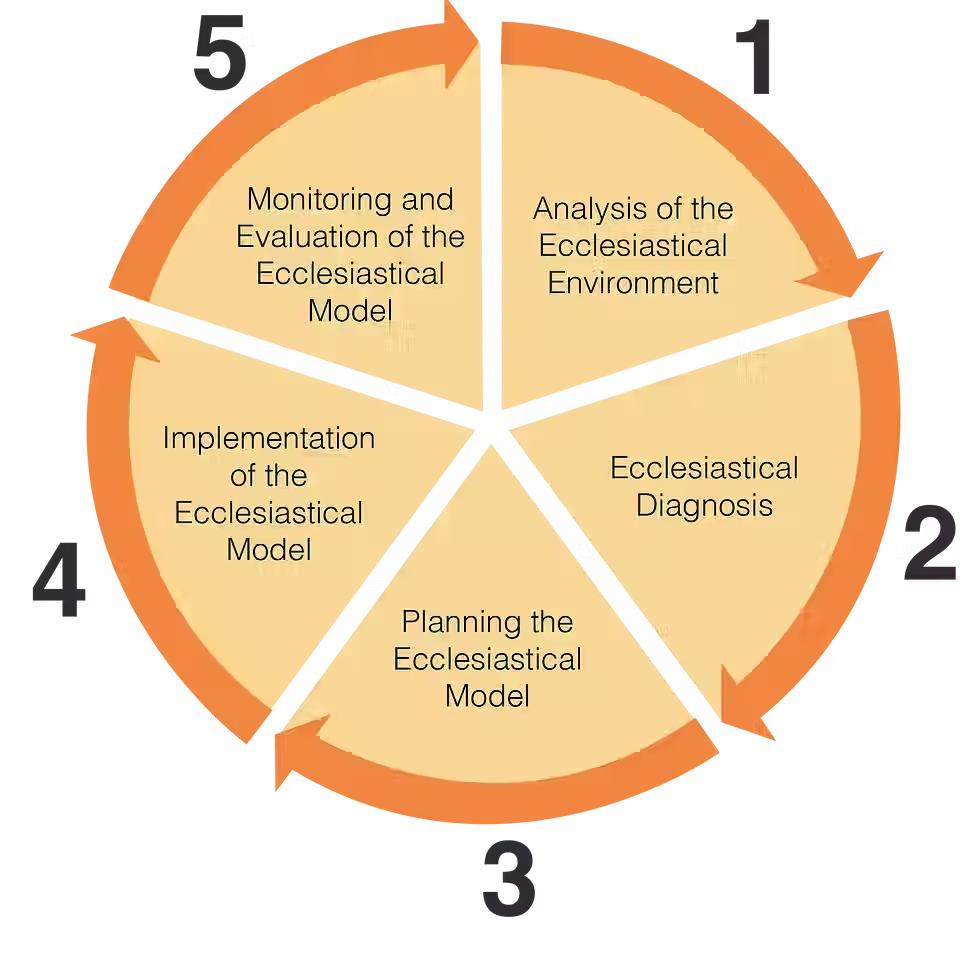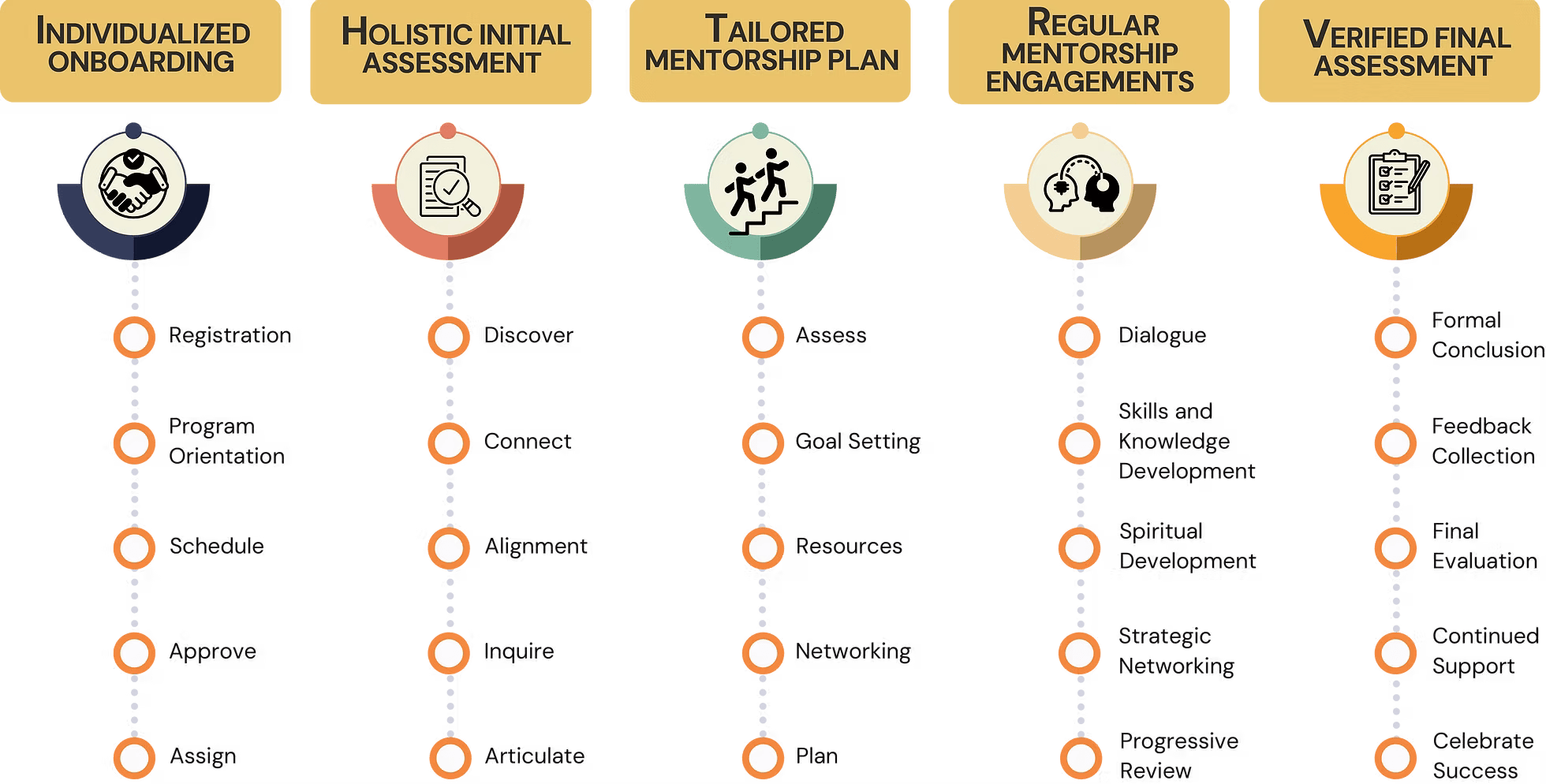
The Challenge: The Strategy-Execution Gap
For many organizations, the shift from defining strategy to achieving measurable, sustained outcomes is the single greatest obstacle to growth. Plans remain on paper, initiatives stall, and investments fail to deliver the expected return. You need more than just a plan; you need a system for Organizational Realization.

Elevate Your Influence. Anchor Your Leadership in Christ.
designed to equip you with the essential biblical principles and practical tools to lead effectively in every sphere of influence—from the marketplace to ministry.



For the Established Leader
You've been faithful in your calling for years, but the weight of ministry can lead to isolation and weariness. Our mentoring for seasoned leaders provides a confidential and rejuvenating space to process challenges, rediscover your "why," and strategically navigate the complexities of long-term leadership. It's an opportunity to finish your race strong, leaving a lasting legacy for the generations to come.
For the emerging leader
You are passionate and ready to make a difference, but the path forward can seem unclear. Our mentorship for emerging leaders offers the guidance and wisdom to build a sustainable and impactful ministry. We'll walk with you as you navigate new responsibilities, cultivate your unique leadership voice, and lay a firm foundation for a lifetime of faithful service.
For the
Limited-access leader
You may be serving in a remote location, a non-traditional ministry setting, or a context with limited resources and support networks. We are committed to ensuring that no leader walks alone. Our program connects you with a dedicated mentor who can provide the encouragement, strategic insight, and biblical guidance necessary to flourish in your unique, God-given assignment.

Unleash Your Potential
By integrating biblical wisdom with practical application, the Strategic Ministry Framework empowers leaders to:
1
Clarify your Vision
Establish a clear, Christ-centered mission that aligns with the Great Commission and the unique calling of their church.
2
Strengthen Doctrinal Foundations
Cultivate a robust theological perspective that shapes ministry decisions and responses to contemporary challenges.
3
Enhance Leadership Effectiveness
Cultivate a robust theological perspective that shapes ministry decisions and responses to contemporary challenges.
4
Optimize Organization Operations
Implement structures and processes that support a vibrant, mission-driven church culture while ensuring efficient administration and stewardship.
5
Engage in Discipleship and Outreach
Encourage a culture of mentorship, discipleship, and community engagement that reflects the heart of Christ’s ministry.
Strategic Focus Areas:

Leadership Capacity Building
Leading today can be complex and demanding. That's why we offer one-on-one and group mentoring tailored to your distinct needs. Our personalized program starts with a thorough assessment, helping us understand you, your church, and its culture. With this insight, we create a customized growth plan that equips you to achieve your vision and reach new levels of success.

Organizational Strategy
is a strategic consulting service dedicated to developing your organization's Definitive Master Roadmap. We deliver a comprehensive, long-term plan that seamlessly aligns your vision and mission with the precise execution steps required to achieve your most critical goals and objectives. This roadmap provides the absolute clarity and direction needed to transform your strategy into measurable success.
What We Do
Focusing on the FEW
to reach the MANY

"Being a leader is both a profound calling and a tremendous responsibility. While it brings deep fulfillment, it can also feel isolating and overwhelming.
The day-to-day operations of a leaders juggle immense demands. Without the right support, this can lead to burnout, loneliness, and exhaustion.
But you don’t have to walk this path alone.
Leadership mentoring offers a trusted space for guidance, encouragement, and growth. Through intentional mentorship, leaders—especially those leading with limited resources—gain practical wisdom, problem-solving strategies, and a renewed sense of purpose.
When leaders thrive, organizations flourish.
Mentorship helps you navigate challenges, cultivate personal well-being, and lead with resilience—nurturing healthier, Christ-centered communities."
—Eduardo Mendes | CEO, LBTN
—Eduardo Mendes | CEO, LBTN
Programs
What we address
56%
of managers are actively looking for a new job.
72%
of leaders report feeling burned out by the end of the day,
15%
of leaders feel prepared to address and prevent employee burnout
Leadership Acceleration & Development
A critical gathering designed to sharpen the focus on the urgent need for strategic leadership development within modern organizations.

Leadership Capacity Building

In a world of constant demands and widespread needs, the most profound impact often begins with focused intention. This is the heart of our Leadership Capacity Building Program. We believe that by investing deeply in the lives of a few dedicated leaders, we can empower them to transform the many lives they touch. This is more than a program—it’s a commitment to a proven model of discipleship and growth.
Through ongoing, personalized mentorship, you’ll have the dedicated space to re-evaluate your leadership in light of the wisdom and actions of Jesus Christ. This is not just about strategy; it's about sanctification in your leadership role.
A Mentoring Journey for Every Leader
We recognize that leadership is not a monolith. The challenges and opportunities you face evolve with your experience and context. Our one-on-one mentoring is tailored to meet you exactly where you are, providing the specific support you need to thrive.
This is a relational, collaborative journey designed to help you reflect, grow, and refine every aspect of your leadership with the support and guidance of someone who’s been where you are. We are here to champion your growth.
Our Commitment to You
We develop well-equipped, confident leaders who thrive in their God-given purpose through practical resources and deeply relational, personalized mentorship.
Your leadership is a sacred trust. Our commitment is to honor that trust by providing a mentoring relationship that is:
-
Christ-Centered: Anchored in the life and teachings of Jesus.
-
Deeply Relational: Built on trust, empathy, and genuine care.
-
Personalized: Tailored to your specific needs, goals, and context.
-
Transformative: Aimed at producing lasting growth in both your inner life and your outward leadership.
Are you ready to invest in your leadership for the sake of the many? Let's walk this path together.
In a business landscape defined by constant change and widespread organizational needs, the most profound, sustainable impact begins with focused intention. This principle is the bedrock of our Organizational Strategy Framework.
We contend that to achieve a broad-reaching, transformative effect, you must first invest deeply and strategically in a few core areas. Rather than spreading resources thin across every potential demand, we champion a commitment to a proven model of clarity and concentrated growth.

Organizational Strategy
Your organization Path to Profound Impact
Our approach moves beyond surface-level planning. It's a journey of ongoing, personalized strategic mentorship that provides your organization with the dedicated space to re-evaluate its purpose, resources, and actions in light of its most critical objectives.
Programs
The One-on-One mentoring program and the organizational development at Lead by the Name was essential to help me organize my thoughts and vision. I felt challenged and encouraged to move forward with God’s vision."
Wellington C. Amorim
The Strategic Church Framework is a comprehensive and structured approach designed to equip pastors and church leaders with the tools necessary to develop a biblically grounded ministerial philosophy. This framework serves as a guiding blueprint for ministry, ensuring that leadership decisions, church growth strategies, and pastoral care initiatives are firmly rooted in scriptural principles.
The 5-step Church Strategy Framework

1
Analysis of the Ecclesiastical Environment: The first step is to gather internal data by conducting interviews and surveys with the leadership and congregation to understand the church's dynamics and history. In addition, it is important to promote moments of fellowship and intentional events that bring members closer together and reveal their stories. Observing current practices and organizational culture is also essential to identifying strengths and weaknesses.
The second step involves assessing the external context, examining the surrounding community, social trends, and local needs. It is also important to compare how other churches address similar challenges, observing their theological lines, physical structures, and what can be learned from them.
2
Ecclesiastical Diagnosis: The first step involves identifying problems and opportunities, mapping the main challenges the church faces, such as lack of engagement, communication issues, unmet needs, and ministerial and relational difficulties. This also includes assessing structural and functional needs. At the same time, it is essential to identify areas of opportunity that can strengthen the church and its impact on the community, promoting training, development, and edification.
The second step focuses on evaluating the spiritual condition of the congregation. This includes analyzing the spiritual atmosphere, observing the level of discipleship, prayer, commitment to the Word of God, biblical knowledge, and missionary and social engagement. It is also crucial to assess the level of involvement of members in ministries and church activities.
3
Analysis of the Ecclesiastical Environment:
The first step is to define goals, both spiritual and organizational. In the spiritual area, this includes growth and discipleship goals with an effective teaching structure for all ministries. On the organizational side, it is important to set objectives for the structure, functionality, and communication of the church, aiming to improve its operations.
The second step involves developing strategies to achieve these goals, creating practical programs, and properly allocating resources. Finally, the proposal should be communicated clearly and motivationally to the leadership and congregation, encouraging active engagement from the members.
4
Implementation of the Ecclesiastical Model: The first step is establishing a biblical philosophy, which starts with theological grounding based on the Scriptures and identifying organizational principles that will guide the church's ministerial structure. The development of a systematic Biblical Ministerial Philosophy (BMP) should reflect these principles practically and contextually. Furthermore, it is necessary to create a vision and ministry mission that align the church with God's will and the Great Commission.
In the second step, the biblical philosophy should be clearly communicated to all leadership and the congregation, followed by appropriate training to ensure that everyone is aligned and prepared to apply it in ministry. Integrating this philosophy into ministerial practice involves developing programs that reflect its principles and providing continuous spiritual support to the leadership and members. After the planned actions are initiated, it is essential to ensure leadership support and constantly monitor progress through feedback and timely adjustments as needed.
5
Monitoring and Evaluation of the Ecclesiastical Model: The first step involves ongoing evaluation, where it is essential to regularly track the progress of established ministerial goals, both spiritual and organizational. Additionally, it is crucial to conduct periodic assessments to verify the impact of changes on the life of the church and the community, ensuring that the goals are being met.
The second step consists of conducting periodic reviews to assess the effectiveness of the implementation and identify areas that need improvement. Based on these assessments and feedback from the leadership and congregation, continuous adjustments should be made to ensure that the church remains aligned with its goals and principles.
3
Become A Mentor
Lead by the Name Mentoring Certification Program (MCP)—an exclusive initiative designed for christian leaders. Through 24 hours of intensive, hands-on training, participants will refine their mentoring skills by engaging in interactive lectures, case studies, and structured assignments. The curriculum blends biblical principles with modern leadership strategies, equipping mentors with essential competencies such as active listening, resource management, and digital tool proficiency.

The THRIV Framework guides the process in an organic and personalized manner, allowing dedicated time for reflection on daily practices and offering support in problem-solving and decision-making. It comprises five essential phases, meticulously designed to ensure comprehensive training, evaluation, and development within the Lead by the Name Mentorship Program.
To become a mentor, individuals must deeply understand and proficiently apply this framework in their mentorship sessions. Each phase encompasses distinct responsibilities, structured processes, and defined deliverables, all strategically designed to foster growth and equip the mentee.

Core Competencies for Certified Mentors
1. Mentorship Understanding– Grasping fundamental principles of mentorship.
2. Biblical Knowledge– Expertise Applying Scripture in mentorship.
3. Field Experience– Utilizing real-world leadership insights in his field of expertise.
4. Training Capability– Effectively equipping mentees mind set.
5. Active Listening Skills– Engaging in intentional, empathetic listening.
6. Organizational Resourcefulness– Managing mentorship efficiently.
7. Technological Proficiency– Leveraging digital tools for mentorship.
Who Should Apply?
At Lead by the Name, we believe that mentorship is a calling, not just a skill set. It requires wisdom, experience, and a heart for guiding others. To uphold the highest standards of mentorship, the Mentoring Certification Program (MCP) is an initiative designed for those who have already demonstrated a deep commitment to leadership, faith, and the personal and professional growth of others, and aligned and passionate by Lead by the Name's vision and Mission. We vet all applicants to make sure there is mutual alignment.
Who Should Apply?
-
Christian leaders invited by Lead by the Name
-
Leaders who are passionate about mentoring and leadership development
-
Individuals committed to integrating faith-based mentorship into their ministry
-
A strong commitment to serving in the Lead by the Name Mentorship Program
Eligibility Criteria:
-
Invitation from Lead by the Name or application through contact form
-
Minimum 8 years of experience in a leadership role in their field
-
Formal or Non-Formal training or certification in their field
-
Strong communication and interpersonal skills
-
Alignment with the mission and Statement of Faith of Lead by the Name